Bonfire Night Safety Visit
This morning, we were joined by our local PCSOs to talk about bonfire night safety. Have a look at our photos for the main messages.
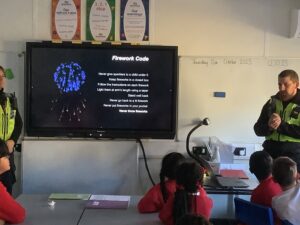

PE: Football
This half term, Year 5 have been practising their football skills (passing, tackling, shooting etc.)
This week, they have been focused on improving their shooting skills.
When shooting, the difficulty is shot selection. Sometimes, it’s important to shoot with more power. At other times, it’s important to shoot with more accuracy.
The children have all enjoyed celebrating their goals!
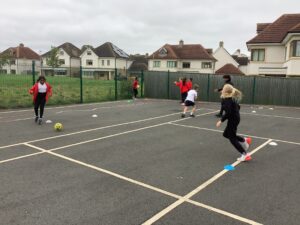

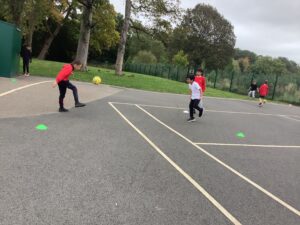
Help at home: discuss the best technique for a pass.
Geography: I can investigate land use in my locality.
This week, during Geography, we’ve planned a walk in our locality so that we can investigate what the land is used for.
There are five main types of land-use:
- agriculture – land used for farming
- residential – land used for housing
- commercial – land used for businesses e.g. shops and restaurants
- recreational – land used for recreational activities e.g. swimming pools and golf courses
- transport – land used for roads, railways and airports
We used a map of Moortown to decide what route we’ll take. We thought about trying to create a loop and to try and pass as many different areas as possible. Have a look at what we decided on:
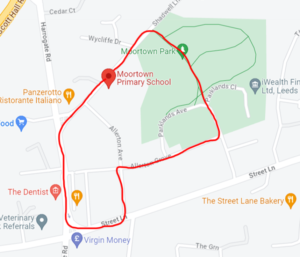
We’ll hopefully pass areas of residential, recreational and commercial land-use while walking along land used for transport! We’ll take pictures of each and label these in our books.
We look forward to showing you the pictures!
Living and Learning: rights and responsibilities
In Year 4, we know that rights come with responsibilities.
For example, we have the right to think and believe what we wish to so we have the responsibility to respect other people’s thoughts and beliefs.
We have the right to an education therefore we have the responsibility to come to school and engage with our learning.
We have the right to food and therefore we have the responsibility to make our own healthy choices.
We have the right to play and we have the responsibility to play safely and sensibly with our friends.
Help at home by asking your child to think of their rights and therefore what responsibilities come with these rights.
Assembly stars!
We are very proud of all the children after performing their first Year 2 class assembly so well this afternoon.
It’s a lot different performing to a full hall than in our rehearsals and there were a lot of nerves.
All the children have learnt their lines, actions, song words and they have used their oracy skills today to help to share our learning.
Thanks to all the adults who were able to come and watch. We hope you enjoyed it.
Well done, Year 2!
Leeds Diving opportunities
Recently, Year 2 and 3 welcomed Leeds Diving as part of their talent in diving programme.
If your child is interested in learning to dive, please see the information and requirements below.

Living and learning: Confident Me
Y6 had a visitor today to talk about being confident in our own skin.
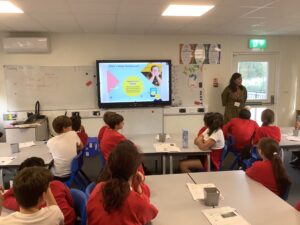
First, we analysed some appearance ideals…
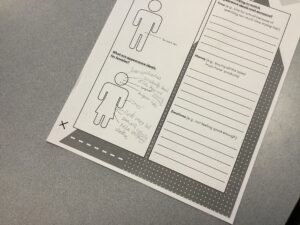
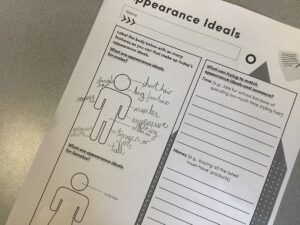
…and discussed the cost of these ideals if you’re trying to match what you see on social media.
“If you spend all your money on clothes then you won’t have any left for playing sport!” explained Olivia.
“You can get carried away, run out of money, and never feel like you’re enough,” warned Tommy.
We learnt about how images online can be manipulated. They can be altered to change the colours or shape of people – or even totally made up by AI!
Sometimes pictures you see online aren’t completely realistic so there’s no point trying to replicate what you see on social media.
Help at home by talking about why it’s good to celebrate being you. What are you proud of? Why are you unique? Why is it good to be different?
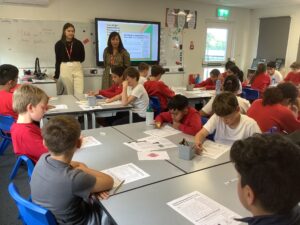
It’s also a good idea to have regular check ins about what you’re doing and seeing on social media.
“We should just say nice things about each other,” said Moosa.
“Don’t focus on what someone looks like – focus on what they’re like on the inside!” wisely stated Cate.
Reading: Y5 met Liz Pichon!
Last week, we had a surprise video call from author Liz Pichon – who writes the Tom Gates novels.
Liz talked about where she gets inspiration for her stories and how she plans out the novels before writing. She talked us through how she draws the doodles in her stories and we also had a go – what do you think of our bugs?!
Finally, she read an extract from her new book, Five Star Stories.
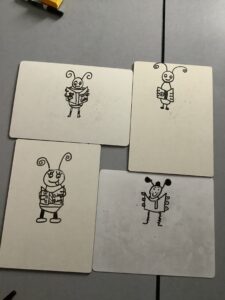
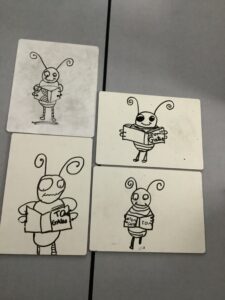
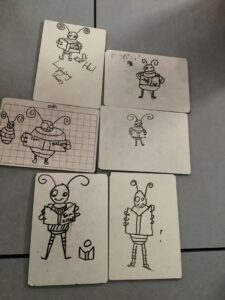
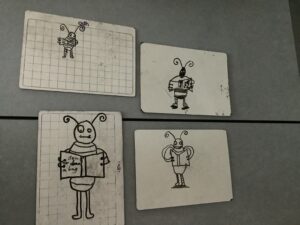
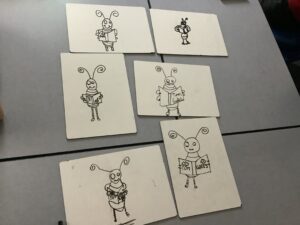
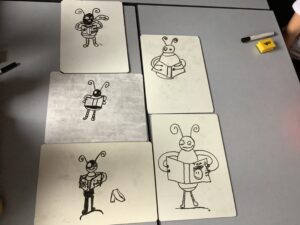
Living and Learning: I respect others!
In our Living and Learning lesson this week, Year 5 learnt about discrimination and the protected characteristics.
Discrimination is defined as ‘the unfair treatment of people because of who they are or because they have a certain characteristic(s)’. We discussed examples and the impact of discrimination.
The Equality Act 2010 protects people from discrimination based on protected characteristics.
We remember the protected characteristics by using the mnemonic:
DR S GRAMPS
Disability
Race
Sex
Gender reassignment
Religion or beliefs
Age
Marriage or civil partnership
Pregnancy and/or maternity leave
Sexual orientation
Help at home: Name the protected characteristics without looking.
Geography: Fantastic Fieldwork!
On Friday, Year 5 ventured to Moortown Park – an urban green space – to conduct their Geography fieldwork. The children were trying to measure carbon stores in the locality. Carbon stores are known as ‘places where carbon is stored in the environment’. To calculate this, they measured the girth (the distance around the outside of something thick) of different trees. They did this by sampling: a way of collecting fieldwork data without measuring everything.
This coming week, we will use this information to work out how much carbon is stored in the trees.
Have a look at us being geographers:
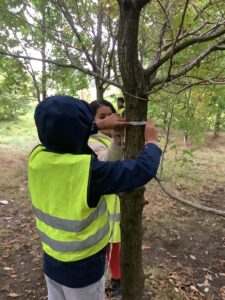
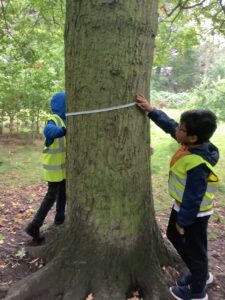
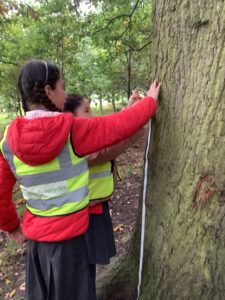
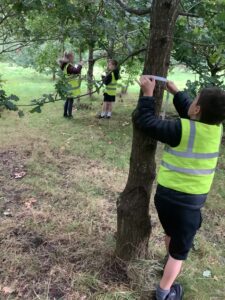
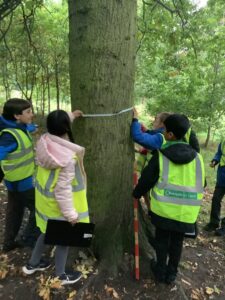
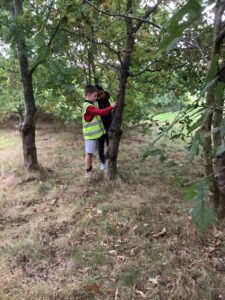

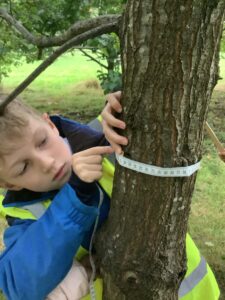

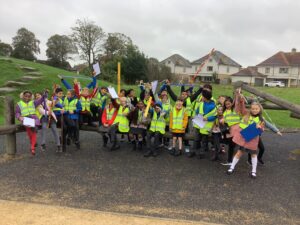
Help at home: To link with our writing skills, spot the parenthesis used in this post!